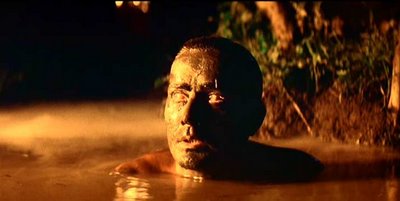In a comment, the question was asked why violence was always sinful. Pondering that further leads to questions of coercion, of violating I-Thou in favour of I-It relations, of defacing the image of God. And so on. (I do wonder whether violence – as in physical aggression – has not become totalised/idolised as a radical evil. Words can do much greater violence to a soul. In many ways, an act of righteous anger – the No! of Camus’ rebel – this seems less immoral than the slow poisoning of human relationships that never leads to direct violence. Jesus, after all, says rather more about language in human relationships than he does about violence.)
A while back, I wrote about capitalism, particularly with respect to Hernando de Soto’s work (see here). One of the key insights of de Soto’s research is the huge obstacles placed in the way of entrepreneurial activity in poor countries; hundreds of forms to be filled in; ages of time before work was rendered legal and visible to the authorities.
It is not an exaggeration to say that the existence of this type of bad-governance is directly responsible for the impoverishment of millions around the world, and that it is also therefore directly responsible for the deaths of millions around the world.
Let us imagine a) that a democratic system achieves a change of government which works to change these things (and therefore save people’s lives), but that b) those with a vested interest in the status quo ante (and there are always such people) resist the new government, not violently, but politically. Their property might be taken away; or, more likely, their economic opportunities and relative economic strengths are diminished. Hence they oppose, they struggle against this new dispensation.
In what way does the treatment of those opposed to this benign economic reform NOT qualify as ‘violent’ – in the deeper sense of coercion, I-Thou to I-It relationships, as opposed to a simple ‘well we haven’t beaten them up, have we?’ These individuals are not being treated as ends in themselves. Their interests and desires are placed in a minor relationship to the interests of the community as a whole.
Imagine that in the interests of non-violent interactions, these people were allowed to keep their perks and privileges – and therefore millions elsewhere remain mired in poverty. This respects the humanity of some, to the exclusion of others.
I think there is something here about masculinity. That the male capacity for making extreme choices – what is consistently explored to great effect in 24 for example – this has been culturally repudiated.
Thing is, Jesus makes extreme choices. You might say: Jesus ain’t no cissy.
I’m trying to put my finger on something darkly and deeply rooted here – a violent passion for life is the best way I can describe it.
That not only is a penis a gift from God, but the phallus too.
This haunting passage from Apocalypse Now:
I’ve seen horrors… horrors that you’ve seen. But you have no right to call me a murderer. You have a right to kill me. You have a right to do that… but you have no right to judge me. It is impossible for words to describe what is necessary to those who do not know what horror means. Horror. Horror has a face… and you must make a friend of horror. Horror and moral terror are your friends. If they are not then they are enemies to be feared. They are truly enemies. I remember when I was with Special Forces. Seems a thousand centuries ago. We went into a camp to inoculate the children. We left the camp after we had inoculated the children for Polio, and this old man came running after us and he was crying. He couldn’t see. We went back there and they had come and… hacked off every inoculated arm. There they were in a pile. A pile of little arms. And I remember… I… I… I cried. I wept like some grandmother. I wanted to tear my teeth out. I didn’t know what I wanted to do. And I want to remember it. I never want to forget it. I never want to forget.
And then I realized… like I was shot… like I was shot with a diamond… a diamond bullet right through my forehead. And I thought: My God… the genius of that. The genius. The will to do that. Perfect, genuine, complete, crystalline, pure. And then I realized they were stronger than we. Because they could stand that… these were not monsters. These were men… trained cadres. These men who fought with their hearts, who had families, who had children, who were filled with love… but they had the strength… the strength… to do that. If I had ten divisions of those men our troubles here would be over very quickly. You have to have men who are moral… and at the same time who are able to utilize their primordial instincts to kill without feeling… without passion… without judgment… without judgment. Because it is judgment that defeats us.
There is something truly frightening about the tragic vision – about the capacity to choose sin boldly (as described in my Iraq post here).
Whilst I feel viscerally the appeal of non-violence, whilst there is still no question in my mind that the way of peace is the way that we are called to live together, I still can’t bring myself to let go of something here. That there is something in the tragic vision, the embrace of the painful choice, which is profoundly life-affirming and of God. There can be no generation without the blood shed from the hymen being broken.
The question of imagination is closely tied in with this – if we imagine only good things, will the bad things go away? I don’t know.
I’m still inching forward through the murk.

